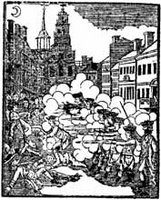Richard Palmes’s Inquest Testimony
 Richard Palmes had a front-row view of the Boston Massacre. He was close enough to Capt. Thomas Preston that, as he later said, “my left hand was on his right shoulder.” At Preston’s trial Palmes said, “The Gun which went off first had scorched the nap of my Surtout at the elbow.” He then laid about him with a “heavy [walking] stick,” knocking one soldier’s hand off his gun, before realizing it would be wise to run away.
Richard Palmes had a front-row view of the Boston Massacre. He was close enough to Capt. Thomas Preston that, as he later said, “my left hand was on his right shoulder.” At Preston’s trial Palmes said, “The Gun which went off first had scorched the nap of my Surtout at the elbow.” He then laid about him with a “heavy [walking] stick,” knocking one soldier’s hand off his gun, before realizing it would be wise to run away.
The next day, Palmes provided a deposition for coroner Thomas Dawes’s inquest on the death of Samuel Gray. I’ve added paragraph breaks and included all interpolated text to make it easier to read, but there’s only so much I can do:
I Richd. Palmes of Boston Apoth’y [?] of Lawfull Age Testafieth & Sayeth, that about 9 oClock Last evening I heard one of the Bells Ring, which I Suppos’d was for fier, upon which I Went towards ware I supposed it was, I ask what the matter was, I was told that the Soldgers was abusing the Inhabetents, I ask ware the Soldgers was, and was told in King Street & that there was a Rumpus at the Custom-house Door,“Capt. Mortons apprentice” was victim James Caldwell; there’s a discussion of his body’s travels here. I tried to nail down Morton’s identity here. “Mr. Kent” was the Whig lawyer Benjamin Kent.
assoon [sic] as I got their, I saw one Capt. Preson at the head of Six or Eight Soldgers, the Soldgers had their Guns Brest high, I went ameadiatly to the Sd. Capt Preson, I ask him if the Soldgers guns were Loaded his Reply was that they ware Loaded with Powder & Ball I then ask him if he intended they should fire his Answer was by no Means, but I Did not here him tell the men not to fire
I saw apice [sic] of Ice fall among the Soldgers Ameadiatly upon this the Soldger at his right hand fired his Gun that Instant I herd the word fire, but who said it I know Not; the Soldgers at his Left fired Next, and the others as fast as they Could one after the other, I turned my Self as Soon as I could & Saw one Lay Dead at my Left, upon wich I struck at the Soldger that fird the first Gun I hit his Left hand which maid his Gun fall, at which I made a Stroke at the offiser, & Struckhim on the Arm at him, and thought I hitt his head, but sd. officer Preson Says I hitt his Arm, on my makg. the Strook I fell on my Right knee, the I then saw the Soldger that first fird, agoing to push his Bayanett at me, upon which I threw my Stick at his head, so he gave Back—and Gave me an Opportunity to Jump frome him, or I must Ben Run threw my Bodey,
Directly I past threw Exchange Lane, and so up the Next Lane by Mr. Kents office, & Saw the Bodey of three persons Laying on the Ground I followd the [body] of Capt. Mortons apprentice Carrg By [?] I followd it up to the parson house, and Saw he had a Ball, shot threw his Breast &c and further Sayeth not.
Palmes’s inquest testimony is preserved in the Boston Public Library’s Mellen Chamberlain collection.
TOMORROW: Richard Palmes gets the last word.

No comments:
Post a Comment